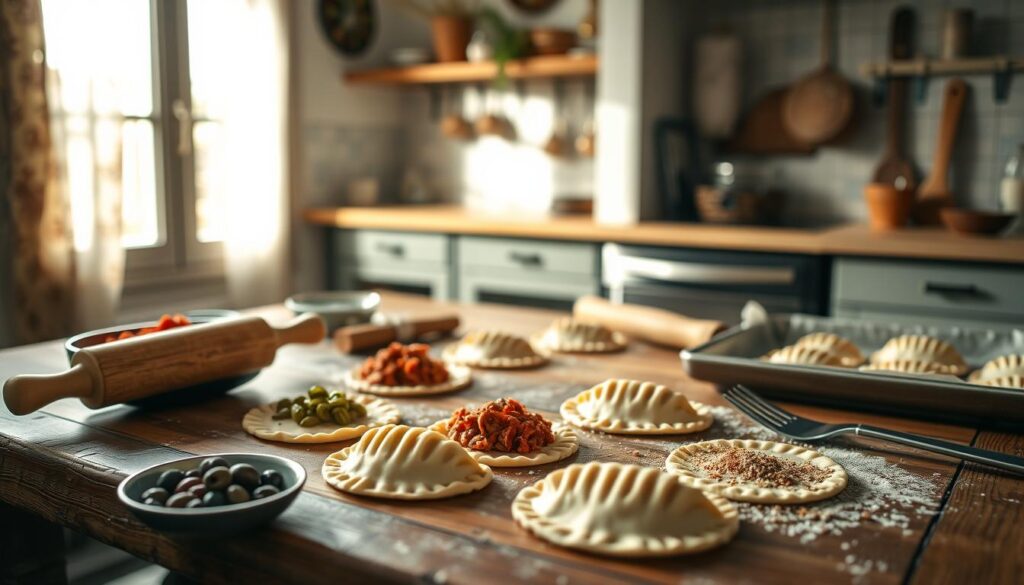Ever wondered why Argentine empanadas are loved worldwide? This guide explores the art of making authentic Argentine empanadas. It’s perfect for both seasoned chefs and curious beginners. You’ll learn key techniques, ingredients, and tricks to make your kitchen feel like an Argentine bakery.
Enjoy making these tasty pastries that impress and bring Argentina’s flavors and traditions to your table!
Key Takeaways
- The guide includes a traditional empanada recipe that has earned a perfect 5-star rating from 146 reviews.
- With a dough recipe yielding about 20 regular size empanadas, it’s ideal for batch cooking.
- Popular filling options include ground beef, chicken, ham and cheese, and vegetarian choices.
- These versatile pastries can be served for breakfast, lunch, or dinner.
- Empanadas can easily be frozen unbaked for up to 3 months, ensuring convenient future meals.
- An array of serving suggestions, such as salads or rice and beans, enhance their presentation.
- Empanadas are not only easy to make but also great for social gatherings, making them a perfect treat for any occasion.
What Are Argentine Empanadas?
Argentine empanadas are more than just savory pastries. They are a traditional dish loved across the country. These tasty treats are filled with meats, cheeses, and veggies. They offer a wide range of flavors, making them a favorite for many.
These pastries have their roots in Spain but have become a key part of Argentine cuisine. They’re great for any event, from snacks to main dishes. You’ll find them at family gatherings, parties, or just as a tasty snack.
The dough of empanadas is special, made with milk for a richer taste. This makes them stand out from other pastries. Classic fillings include ground beef, spices, and local ingredients like olives and hard-boiled eggs. These ingredients create a perfect mix of flavors in each bite.
Exploring Argentine empanadas opens up a world of flavors. You can bake or fry them, letting you enjoy them in your favorite way. Making empanadas connects you to Argentine culture and cuisine.
History of Empanadas in Argentina
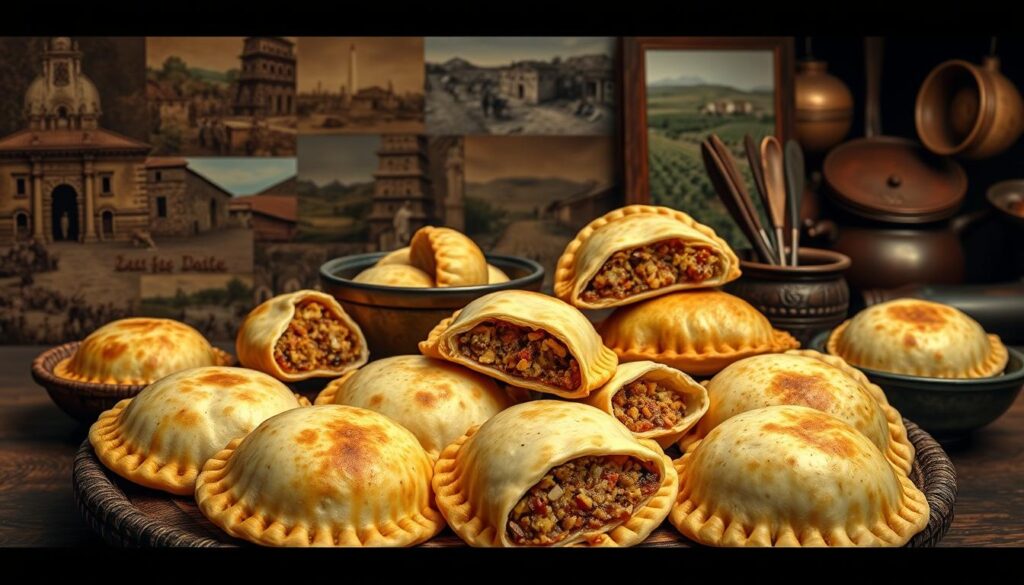
Empanadas in Argentina have a long history, starting in Spain in the 1520s. They were first mentioned in a Catalan cookbook. Over time, these pastries evolved from large pies to small, hand-held treats. They became a favorite in Argentina, loved for their personal size.
Today, empanadas are a symbol of Argentine culture, enjoyed everywhere. You can find them at street vendors and trendy spots in Buenos Aires. Their fillings mix Italian tastes with local ingredients, making them unique.
Empanadas were once the go-to meal for workers, easy to eat on the go. They became more than just a snack, showing their deep cultural value. Each region in Argentina has its own version, adding to their rich history.
| Region | Popular Fillings | Flavor Profile |
|---|---|---|
| Tucumán | Hand-cut beef, cumin, paprika, pepper | Savory and aromatic |
| Salta | Beef, potatoes, onion, bell peppers, hard-boiled eggs | Hearty and filling |
| Jujuy | Chicken, beef, goat, llama, onion, chili, quinoa | Spicy and diverse |
| Entre Ríos | Rice soaked in milk | Rich and creamy |
| La Pampa | Hard-boiled egg, carrots, currants, red peppers | Sweet and savory |
| Patagonia | Lamb or seafood (octopus, spider crab) | Rich and oceanic |
| Córdoba | Ground beef, potatoes, olives, raisins, garlic | Complex flavors with sweetness |
The variety of empanadas shows their journey through Argentine culture. They are a big part of cafes, restaurants, and festivals like the National Empanada Festival since 1979. Their story is a testament to their importance in Argentine food traditions.
Essential Ingredients for Empanadas
To make real Argentine empanadas, you need the right mix of filling and dough. Empanadas are great because you can use many different ingredients. This lets you make them your own way.
Common Filling Ingredients
The filling can be simple or fancy. Here are some favorites:
- Ground beef
- Onions
- Green olives
- Hard-boiled eggs
- Spices like chili powder, cumin, and paprika
For a traditional beef empanada, you’ll need ground beef, a large tomato, green olives, and hard-boiled eggs. These ingredients make a tasty mix.
Understanding Albondigas and Dough
The dough is the outer layer of your empanada. It’s made from:
- 3 cups of all-purpose flour
- ¼ teaspoon of salt
- ¾ cup of unsalted butter
- 1 large egg
- ¼ to ½ cup of water
This dough makes a strong, flaky pastry. You can bake or fry it. Baking makes it soft, while frying makes it crispy.
Think about the calories too. Each empanada has about 78 calories. Plan for 1-2 per person to make sure everyone gets enough.
| Ingredient | Quantity |
|---|---|
| Ground Beef | 1 pound |
| Large Tomato | 1 |
| Hard-Boiled Eggs | 3 |
| Pitted Green Olives | ½ cup |
| All-Purpose Flour | 3 cups |
| Unsalted Butter | ¾ cup |
| Water | ¼ to ½ cup |
With the right ingredients and dough, you can make delicious empanadas at home. It’s a fun and tasty project.
How to Make Argentine Empanada – Traditional Recipe Guide
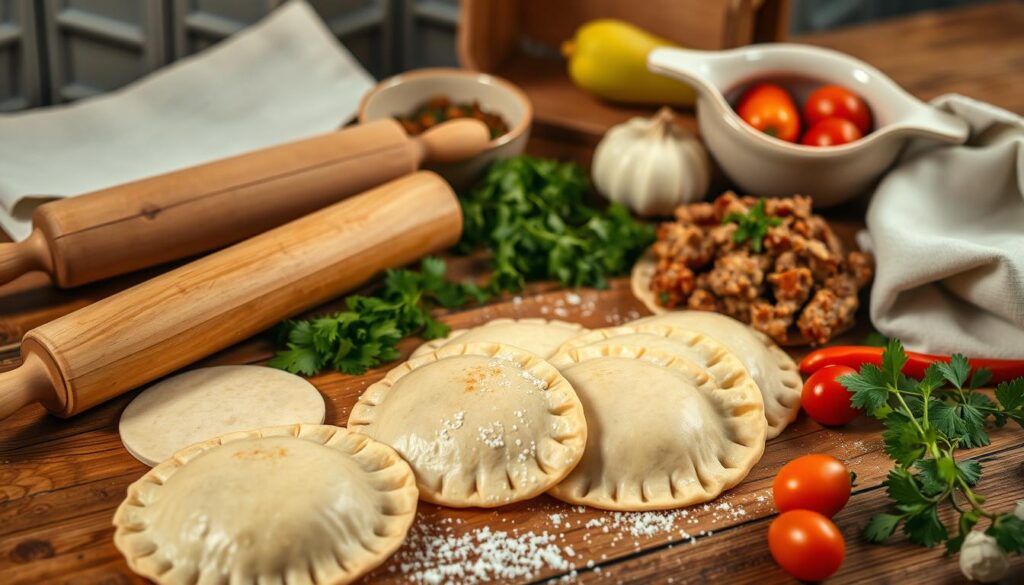
Learning to make Argentine empanada is a fun journey. This guide will walk you through making the dough and filling. It highlights the need for fresh ingredients and the right technique.
Begin with your filling. For a traditional beef empanada, use 93/7 ground beef. Heat a pan with 1 tablespoon of olive oil. Add 1 cup of chopped yellow onion and 1 diced red bell pepper until they’re soft.
Then, add the ground beef and cook until it’s browned. Season with 1 ½ teaspoons of oregano, 1 teaspoon of cumin, 1 teaspoon of garlic powder, and 1 teaspoon of paprika. Don’t forget salt and cayenne pepper. Mix in ½ cup of chopped green olives and 2 chopped boiled eggs. Let it cool and chill in the fridge for 30 minutes.
Now, make the dough. You can use homemade dough or store-bought Goya discs. Roll out the dough and cut into rounds. Place a spoonful of beef filling in the center and fold into a half-moon. Seal the edges with your fingers or a fork.
To bake, preheat your oven to 375°F. Place the empanadas on a baking sheet lined with parchment paper. Bake for 20 to 25 minutes until golden.
This recipe is great for meal prep. You can make the filling up to three days in advance. Unbaked empanadas can be frozen for up to three months. Leftovers can be stored in the fridge for up to four days.
By following this guide, you’ll learn to make Argentine empanada. You’ll bring a taste of Argentina to your kitchen!
Classic Filling Options
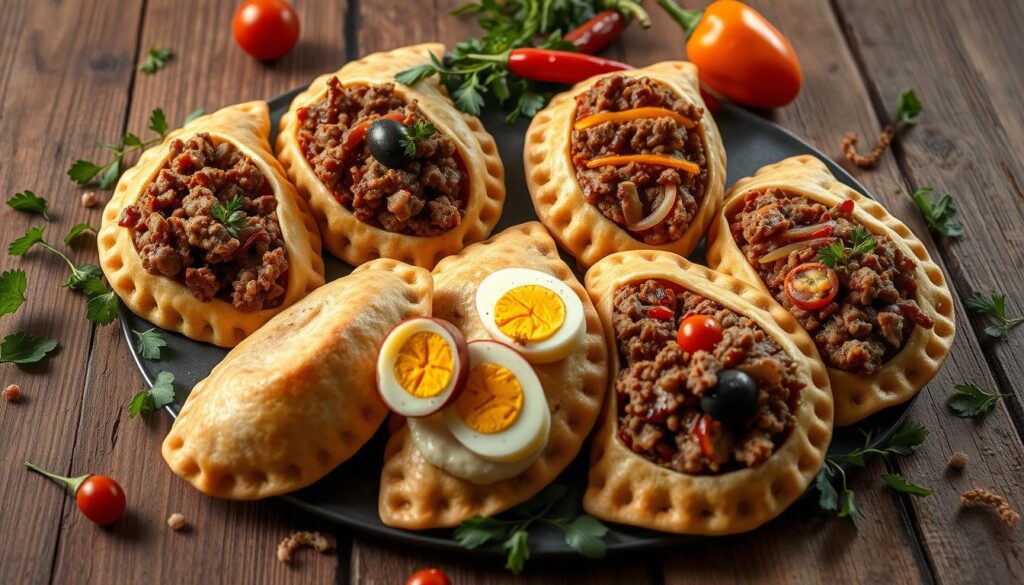
Exploring classic fillings for Argentine empanadas shows the dish’s rich flavors and diversity. Traditional recipes include the famous ground beef empanada and the chicken empanada recipe for a lighter choice. Vegetarians have hearty alternatives that are satisfying without meat.
Ground Beef Filling
The ground beef empanada is a staple in Argentine cuisine. It combines 2 pounds of ground beef with onions, olives, and hard-boiled eggs. Garlic and paprika add to the flavor, making it rich and delicious.
The filling cooks quickly, with the beef taking 5 minutes and tomatoes 2. Baking them for 20 to 25 minutes results in a golden-brown finish. They’re perfect for any meal.
Chicken Empanada Recipe
The chicken empanada recipe is a lighter option. It uses shredded chicken, cheese, and vegetables, seasoned like the beef version. The chicken’s taste blends well with herbs, making it a favorite for those trying new flavors.
Vegetarian Alternatives
Vegetarian options like spinach and cheese or potato and cheese are satisfying. They offer a rich taste without meat. These empanadas are packed with nutrients and can be customized with spices or vegetables.
| Filling Type | Main Ingredients | Cooking Time (minutes) | Cooking Method |
|---|---|---|---|
| Ground Beef Empanada | Ground beef, onions, olives, hard-boiled eggs | 5 (filling), 20-25 (baking) | Baked / Fried |
| Chicken Empanada | Shredded chicken, cheese, vegetables | Varies slightly | Baked / Fried |
| Vegetarian | Spinach, cheese, potatoes | Similar to meat fillings | Baked / Fried |
Each filling offers a unique taste, reflecting the traditions of empanada-making in Argentina. Whether you pick ground beef, chicken, or a vegetarian option, you’ll enjoy a true flavor experience.
Step-by-Step Dough Preparation
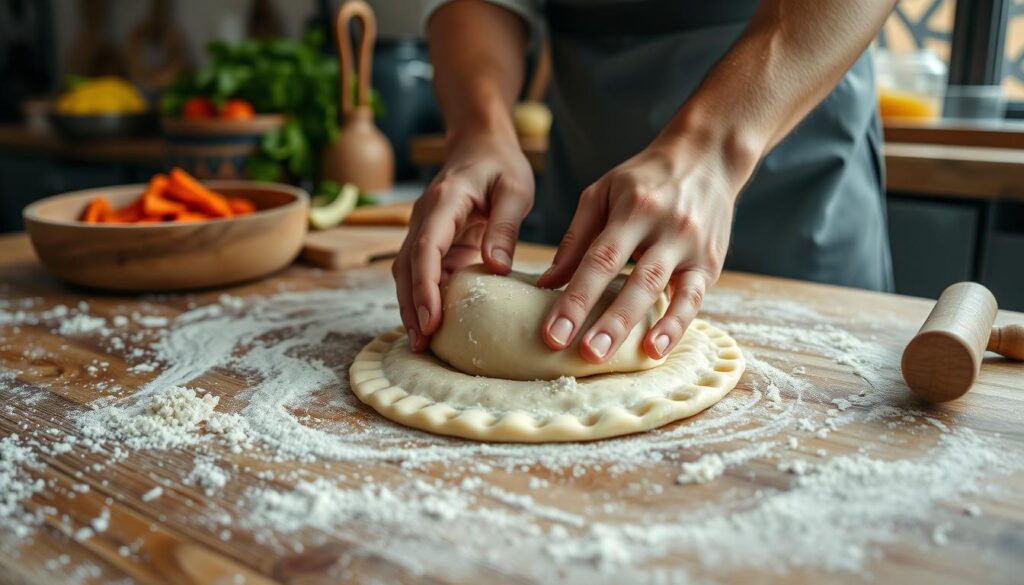
Making the perfect empanada starts with the dough. The dough-making process is fun and rewarding. You can make it from scratch or use store-bought dough. This guide will help you with both options.
Making Homemade Empanada Dough
First, gather your ingredients. You’ll need:
- 1,000 grams all-purpose flour
- 20 grams kosher salt
- 200 grams vegetable shortening or lard
- 370-400 grams of water at room temperature
Mix the flour and salt together. Add the shortening until it looks like coarse crumbs. Then, add water slowly until a dough forms.
Let the dough rest at room temperature for about 1 hour. For better results, refrigerate it tightly wrapped for up to a day before using.
To roll out the dough, you have two choices. You can roll it to 4 mm thick and fold it in thirds twice. Or, roll it to 2 mm, spread with fat, roll tightly, and cut into sections for thinner discs.
Using Store-Bought Dough
If you’re short on time, store-bought dough is a good choice. Many stores sell pre-made dough that’s easy and tasty. Just thaw it as instructed and start filling and baking your empanadas.
Remember, refrigerate filled empanadas for at least an hour. This helps the dough rest and the fat firm up before baking. Preheat your oven to 400°F and brush with a beaten egg for a golden finish.
| Aspect | Homemade Empanada Dough | Store-bought Empanada Dough |
|---|---|---|
| Prep Time | 3 hours | Varies (Usually 30 mins) |
| Texture Control | Customizable | Fixed |
| Complexity | Requires technique | Easy to use |
| Yield | Approximately 48 empanadas | Varies by brand |
Baking vs. Frying: The Best Method for Empanadas
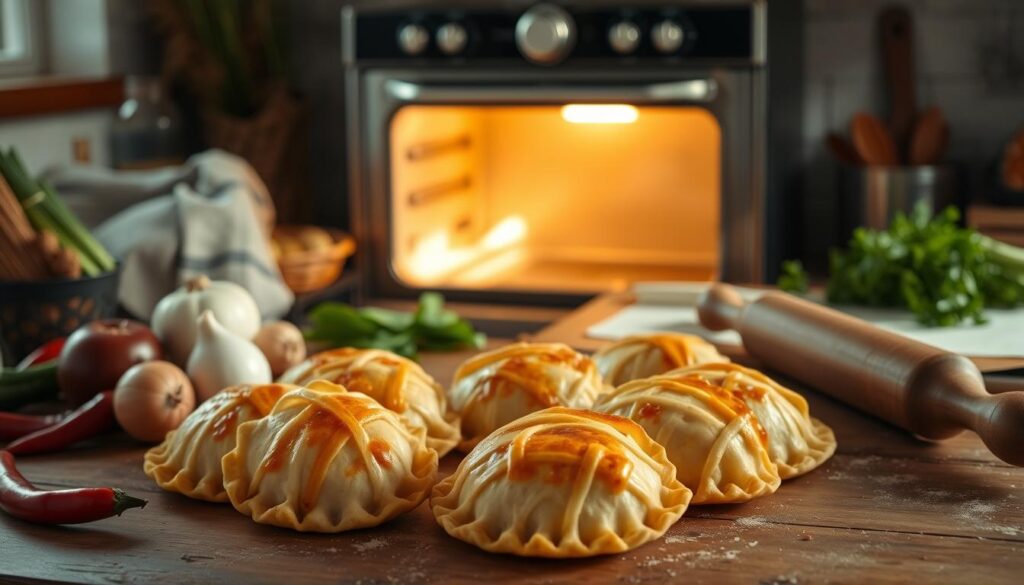
Preparing empanadas can be done in two main ways: baking empanadas and frying empanadas. Each method has its own benefits. Baking gives you a lighter, crispy pastry that’s tasty. Frying, on the other hand, adds a rich flavor and a crispy texture.
Empanadas are great for busy lives because you can make them in bulk and freeze them. You can also make the dough ahead of time with simple ingredients like flour, butter, and eggs. This keeps your pastries true to traditional cooking methods.
Choosing the right filling is key. A classic Beef Empanada has ground beef, onions, peppers, and spices like cumin and paprika. It’s a dish that brings back memories for many, rooted in Argentine traditions.
Here’s a quick comparison to help you decide:
| Method | Cooking Time | Texture | Health Consideration |
|---|---|---|---|
| Baking | 20-25 minutes at 400°F | Crispy and golden | Healthier option |
| Frying | About 5 minutes at 365°F | Rich and crispy | Traditionally indulgent |
Think about your cooking style and the occasion when you make empanadas. Serve them with chimichurri sauce for an extra boost. Whether you choose baking empanadas or frying empanadas, you’re in for a treat.
Tips for Perfecting Your Empanada Technique
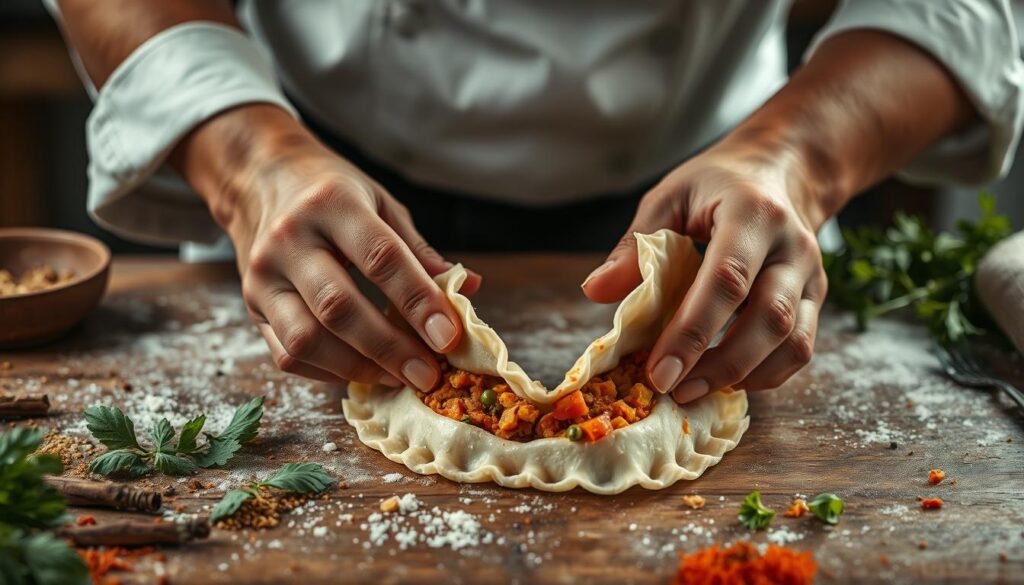
Making empanadas is all about practice and detail. Focus on sealing them well and picking the best cooking method. This will make your empanadas taste and feel amazing every time.
Sealing Your Empanadas
Sealing empanadas right is key to keep the filling inside. Here are some top tips for sealing:
- Crimping the edges with a fork: This method seals the filling and looks nice too.
- Pinching the edges tightly: Press hard to make a strong seal.
- Using water or egg wash: Wetting the edges helps them stick better.
Choosing the Right Cooking Method
The cooking method you pick can really change how your empanadas taste and feel. Here are some common methods:
| Cooking Method | Description | Pros | Cons |
|---|---|---|---|
| Baking | Cooked in an oven at 400°F for about 25 minutes. | Healthier, keeps flavors well. | May not be as crispy as fried ones. |
| Frying | Deep-fried until golden and crispy. | Rich taste, crunchy texture. | Higher in calories and fat. |
| Air Frying | Cooked in an air fryer for a crispy finish. | Less oil, still crispy. | May need cooking time adjustments. |
Choose your cooking method wisely. Remember, sealing well and picking the right method are key. Your empanadas will turn out delicious and everyone will love them!
Serving Suggestions for Argentine Empanadas
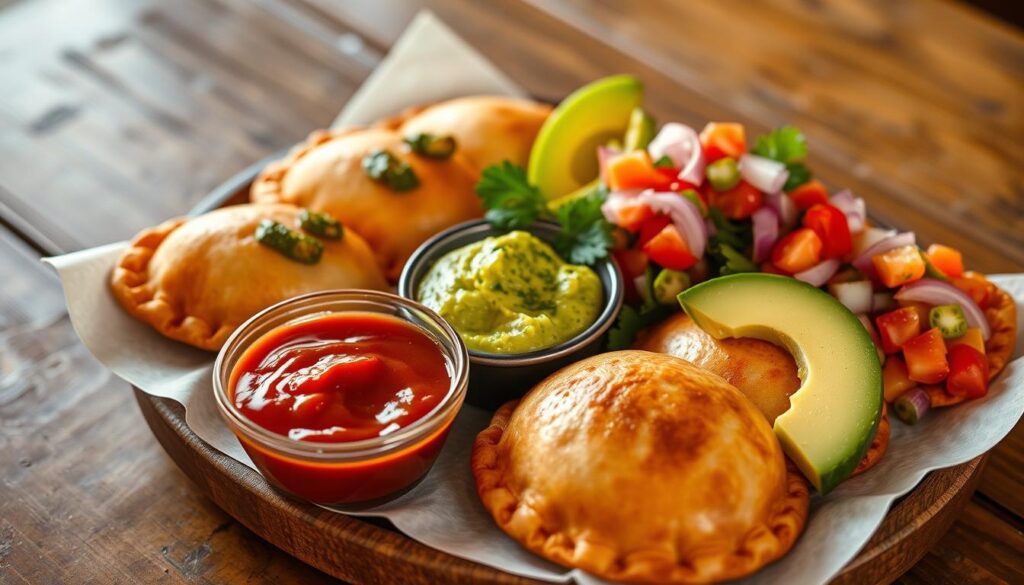
Mastering empanada cooking is just the start. Serving empanadas in a thoughtful way can make the meal even better. Pairing them with the best sides for empanadas can really boost their taste and look.
- Chimichurri Sauce: This classic Argentine sauce is great for dipping.
- Fresh Salads: A simple green salad with tomatoes and cucumbers is a nice contrast.
- Salsa Criolla: This mix of onions, tomatoes, and peppers adds a zesty crunch.
- Roasted Vegetables: Seasonal roasted veggies add a sweet and savory touch.
Exploring Argentine empanadas can be fun. Try pairing those from Buenos Aires with the spicier ones from Salta. Their unique flavors will make your meal interesting.
For a sweet twist, serve Humita empanadas with sweet corn and béchamel. Pair them with a light fruit salad for dessert. This mix creates a unique twist on traditional serving.
With these ideas, you can turn a meal into a memorable experience. Enjoy the variety and flavors in every bite!
Storing and Freezing Empanadas for Later Use
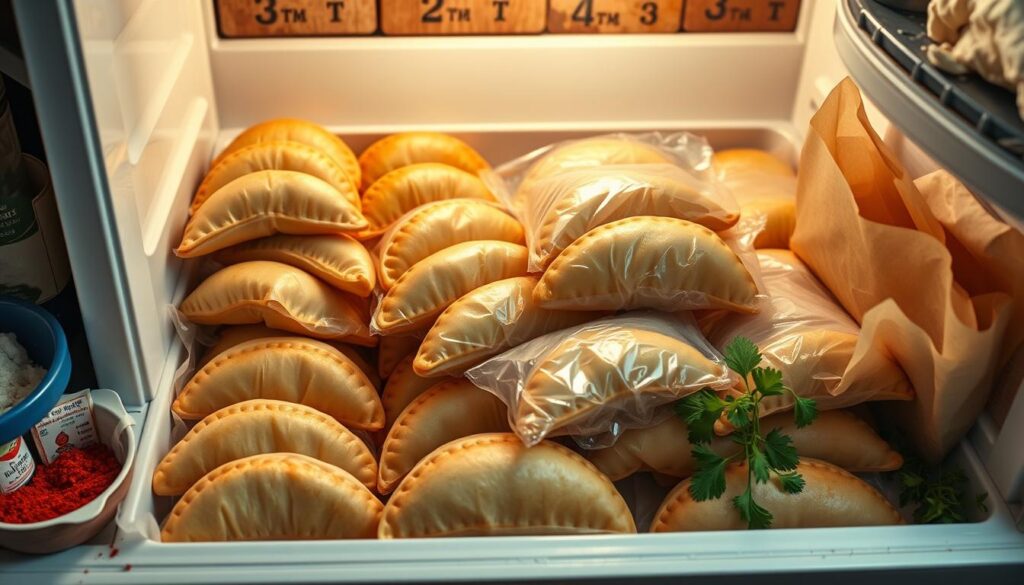
Making a batch of empanadas is a great way to enjoy homemade flavors without daily time commitment. Freezing empanadas lets you enjoy delicious meals whenever you want. By learning the best ways to store empanadas, you can keep them fresh and ready to eat.
Freezing empanadas is a smart way to prepare for future meals. You can freeze them uncooked or after baking. Here’s how to freeze them uncooked:
- Prepare the empanadas as directed, making sure to seal them tightly to avoid freezer burn.
- Place the formed empanadas in a single layer on a baking sheet and freeze them for about two hours.
- Once they’re solid, move the empanadas to a freezer bag, trying to remove as much air as you can.
Uncooked empanadas can stay in the freezer for up to three months. If you have leftovers after baking, just refrigerate them. They usually last for several days, so you can enjoy them all week.
When it’s time to enjoy your make-ahead empanadas, reheating is key to keeping the flavor and texture. For baked empanadas, preheat your oven to 350°F and bake for 15-20 minutes. If they’re frozen, bake for 25-30 minutes.
Knowing how to store and freeze empanadas properly means you can enjoy the rich tastes of Argentina any day. With a few simple steps, a delicious meal is always just a few minutes away.
Variations of Argentine Empanadas
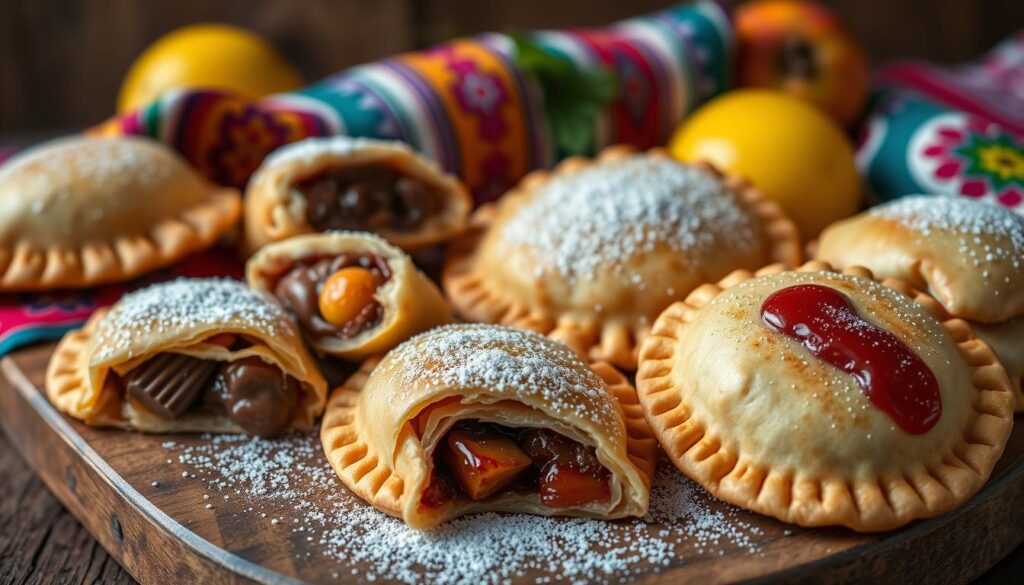
Empanadas are not just savory; they can also be sweet. This makes them perfect for different tastes and events. Sweet empanadas offer a new flavor by using ingredients like fruit preserves, chocolate, or dulce de leche.
Sweet Empanadas
Trying unique empanada recipes for sweet ones lets you get creative. Here are some favorite fillings:
- Fruit preserves such as peach or strawberry
- Chocolate and hazelnut spread
- Dulce de leche with a pinch of cinnamon
- Caramelized apples with a sprinkle of nutmeg
- Custard with vanilla essence
Sweet empanadas add a new twist to your cooking. Serve them warm, dusted with powdered sugar, for a perfect dessert. They’re great for gatherings or a cozy treat after dinner. Share your unique empanada recipes and impress everyone with your creativity.
Conclusion
Your journey into making Argentine empanadas is a dive into a beloved part of traditional Argentine cuisine. It’s filled with strong flavors and a rich heritage. You can try many empanada recipes, from classic minced beef to tasty vegetarian ones.
These recipes celebrate culture and creativity. The ingredients, like fat for flaky dough, fresh veggies, and spices, make the dish irresistible.
Now, you know how to make these savory pastries. You’ve learned tips for baking or frying them. It’s time to start making your own empanadas.
With every bite, you’ll taste Argentina’s flavors and your personal touch. Whether you bake them golden or fry them crispy, they’ll be a hit!
So, why not dive into this vibrant food culture? Start cooking like a local. Make your own Argentine empanadas and share them with family and friends. Just like many families have done for generations. Happy cooking!

